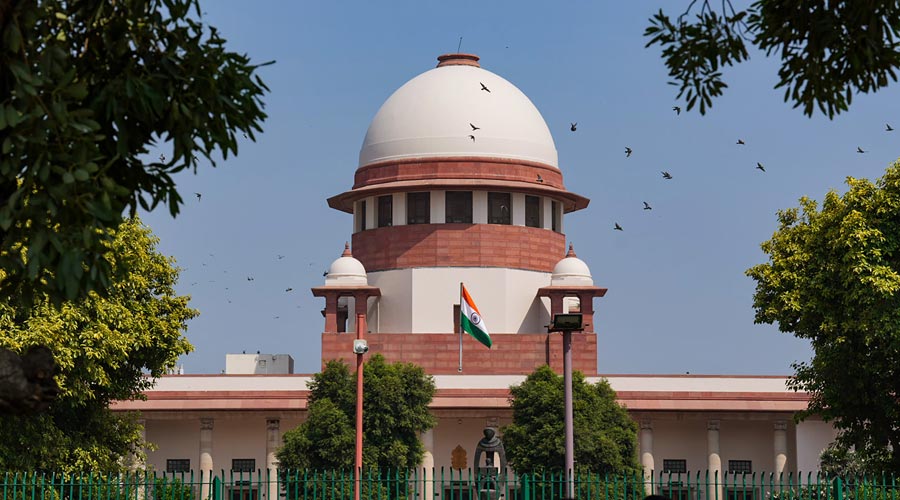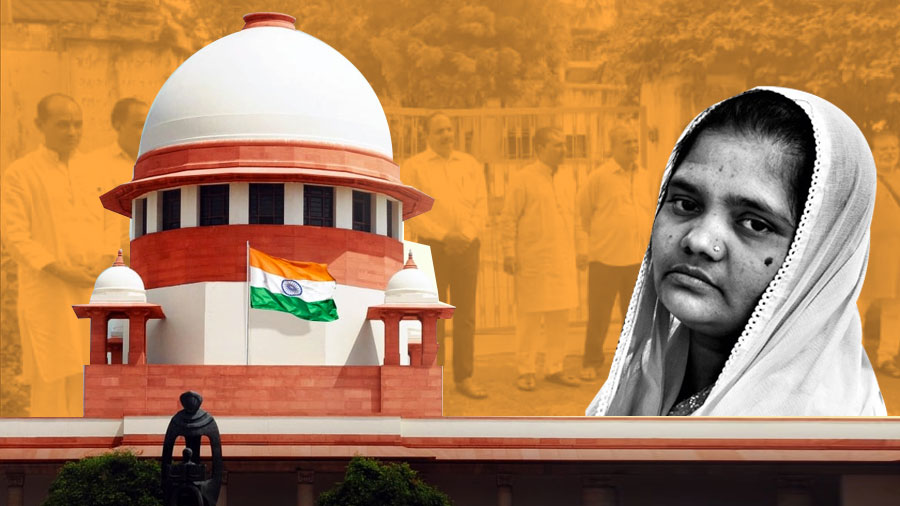The Supreme Court on Monday issued notices to the central and Gujarat governments on the release of 11 lifers in the Bilkis Bano gange-rape-and-murder case, terming the offence “horrendous” and wondering whether the same “standards” had been applied to the hundreds of other jailed murderers.
“This was a heinous offence. It was horrendous. And for murder cases convicts are languishing in jails without remission. So, is this a case where the standards have been adopted uniformly in other cases also?” Justice K.M. Joseph said during the hearing.
The Gujarat government had with the Centre’s consent remitted the life sentences of 11 men convicted of gang-raping a pregnant Bilkis and murdering seven members of her family during the 2002 riots. It released them on August 15 last year.
On Monday, the bench of Justices Joseph and B.V. Nagarathna issued the notices not only on a petition filed by Bilkis but also on a batch of PILs moved by activists. It rejected the plea from advocate Rishi Malhotra, appearing for one of the convicts, that the activists had no locus standi. While seeking responses from the Centre and the state government on the rationale and policy adopted for the convicts’ release, the court posted the matter for hearing from 2pm on April 18. It asked the two governments to be ready with the files relating to the remissions.
The bench also asked whether the victim (Bilkis) had been heard before the apex court, on May 13 last year, directed the Gujarat government to consider remission for one of the convicts. Malhotra clarified that the May 13 order was passed on an application from one individual convict, and therefore there was no requirement to hear the victim. He said Gujarat and the Centre were party to the case (central agency CBI had probed the case) and were heard. Advocate Shobha Gupta, appearing for Bilkis, said the jurisdiction (for possible remission) was actually vested with the Maharashtra government (since the trial was held in Maharashtra) but Gujarat wrongly exercised the power to grant remission.
Senior advocate Vrinda Grover, appearing for one of the PIL petitioners, said remission should not have been granted as the convicts’ crimes involved multiple murders and gang rape. Besides, they had not paid the fine of Rs 34,000 as sentenced, she said, arguing they should have spent at least 34 years in jail on this count alone.
Grover alleged that some of the convicts had during parole been involved in molestation. She said the remissions had been granted against the remission policies of both the Centre and the state government, which prohibited premature release for heinous offences like gang rape and murder. Malhotra, however, argued that the convicts had been released on the basis of a 1992 remission policy. Gujarat’s stand is that it released the convicts on the basis of the May 13 order passed by the apex court bench of Justices Ajay Rastogi and Vikram Nath, directing it to consider the plea for release moved by one of the convicts, Radheshyam Bhagwandas Shah.
Radheshyam had petitioned the apex court after Gujarat High Court ruled that the Maharashtra government alone had the power to consider the convicts’ release. Justice Joseph wondered whether the Gujarat government could have applied its remission policy if the power was conferred on it solely by the apex court’s May 13 judgment. He cited the Supreme Court judgment in the “A.R. Antulay case” to say that even the top court cannot clothe any institution with power and jurisdiction. Senior advocate Abhishek Manu Singhvi, appearing for another PIL petitioner, said even the trial judge who had handed out the convictions had opposed the convicts’ release. “No weight was given to him (by the Gujarat government),” Singhvi said.
Senior advocate Kapil Sibal, also appearing for some of the PIL petitioners, said the apex court ought to lay down broad guidelines relating to the grant or refusal of remission. “This is not an ordinary case. The matter was transferred from Gujarat to Maharashtra by this court because there was no confidence in the Gujarat government. But now the same state has decided their remission. What is this?” Sibal asked. Malhotra said that Gujarat had an advisory board, with members ranging from social workers to experts, which had noted the convicts’ good behaviour. He said the convicts had spent 15-and-a-half years in jail and that the requirement for remission was 14 years. “This is more of an emotional plea than a regular plea,” Malhotra said, prompting Justice Joseph to remark: “We are only on legal and law and nothing to do with emotions.”
CPI leader Subhashini Ali, two others and Trinamul MP Mahua Moitra had filed public interest petitions seeking cancellation of the remissions, but some of the convicts objected saying they were not the victim. Subsequently, Bilks moved two petitions. One was a review petition challenging the apex court’s May 13 order. It was dismissed in December. On Monday, the apex court issued the notices on Bilkis’s other petition, a writ petition challenging the Gujarat government’s grant of the remissions, and the PILs.


